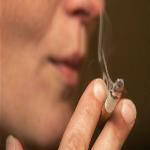
This is the VOA Special English Health Report.
Chronic obstructive pulmonary disease, or COPD, is a life-threatening condition commonly caused by years of smoking. Doctors say that over time the damage interferes with the natural exchange of oxygen and carbon dioxide in the lungs.
COPD is not curable but treatment can extend a patient's life. Doctors often treat it with steroids. Now, a study shows that low doses of the medicine given by mouth are equal to, or better than, a heavy dose administered into the blood.
Researchers studied patients treated at 400 hospitals in 2006 and 2007. The patients received steroids either intravenously or by mouth.
The study found that those who received lower doses of steroids by mouth spent less time in the hospital. Also, their risk of side effects such as glaucoma, high blood pressure and edema, or swelling in the legs, was reduced.
Peter Lindenauer from Tufts University School of Medicine in Boston, Massachusetts, led the study. The findings are in the Journal of the American Medical Association.
The World Health Organization estimates that more than 200 million people have been found to have COPD. Most live in low and middle income countries.
COPD blocks airflow in the lungs. Patients have to think about their breathing. They also have to exercise. And they have to learn to calm themselves, especially when they are short of breath.
SOUND: "Big deep breaths in through your nose and out through your mouth."
Chronic obstructive pulmonary disease includes emphysema and chronic bronchitis, as well as asthmatic bronchitis. One sign of it is a wheezing sound when the person breathes. Another symptom is a cough that produces yellow mucus and does not go away.
Miners and chemical workers are at risk of COPD from breathing dust and harmful chemicals. But the most common cause is long-term smoking or years of breathing other people's smoke.
Francis Welch is a retired dentist, former smoker and now a COPD patient.
FRANCIS WELCH: "I have to think about breathing 60 minutes of every hour. It's a heck of a nuisance."
He stopped smoking more than ten years ago. He also persuaded his son to stop.
FRANCIS WELCH: "Until he saw me walking around with a can of liquid oxygen. That got his attention. He finally did smoke, quit smoking, thank God."
And that's the VOA Special English Health Report, with reporting by Melinda Smith. Transcripts, MP3s and archives of our reports are at voaspecialenglish.com. I'm Steve Ember.
pulmonary: connected with the lungs 肺的;肺部的;与肺有关的
steroid: a chemical substance produced naturally in the body. There are several different steroids and they can be used to treat various diseases and are also sometimes used illegally by people playing sports to improve their performance. 甾族化合物;类固醇
intravenously: 通过静脉
glaucoma: an eye disease that causes gradual loss of sight 青光眼
edema: 浮肿;水肿
emphysema: a condition that affects the lungs, making it difficult to breathe 肺气肿
bronchitis: an illness that affects the bronchial tubes leading to the lungs 支气管炎
mucus: a thick liquid that is produced in parts of the body, such as the nose, by a mucous membrane 黏液;鼻涕
Half of smokers fail to quit habit alone, poll finds
Every breath they take is killing them
Smoking has immediate, adverse effects on the body
(来源:VOA 编辑:陈丹妮)
